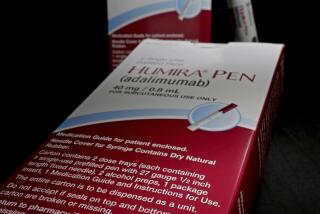MBI Has Rights to Ultrasound Agent : Biotech Firm Swept Up in Frenzy Over New Product
From its founding in 1980 until late last year, Molecular Biosystems Inc. did not generate much excitement on Wall Street.
The San Diego-based biotechnology company had posted net losses every year since its inception and was viewed in some corners as just one company among many striving to produce DNA probe-based medical diagnostic kits.
A $2.5-million investment by E.I. du Pont de Nemours & Co. in 1986, which gave the chemical giant a 6% ownership stake in MBI and which was portrayed by MBI management as a vote of confidence in MBI’s technology, left the investment community relatively unimpressed.
Since late last year, however, Molecular Biosystems stock has been swept up in speculative frenzy for reasons that apparently have little to do with its core DNA technology. Investor enthusiasm is focused, instead, on a product called Albunex, a contrast agent for a medical diagnostic procedure called ultrasound imaging that MBI acquired rights to in November.
All-Time High Stock Price
That attention has pushed Molecular Biosystems’ stock up from about $3 per share in November to a Friday close of more than $14 per share, an all-time high. Over-the-counter trading volume also has reached unheard-of levels, totaling nearly 1 million shares during the week ended May 1, compared to a typical weekly volume of 200,000 shares a year ago, President Vincent Frank said Friday.
The interest in MBI stock is grounded in the possibility that Albunex could become the first non-radioactive imaging agent to allow cardiologists to view, via ultrasound imaging, pictures of blood flowing through the heart. That flow, called myocardial perfusion, is a critical piece of knowledge for doctors treating heart patients, medical industry analyst Paul Brown of San Francisco-based Hambrecht & Quist said.
Developed by University of Chicago medical researcher Steven Feinstein, who last November signed over worldwide marketing rights to MBI in exchange for royalties and a flat fee, Albunex someday could have an annual worldwide market in the tens, even hundreds of millions of dollars, analysts say.
As stressed by Frank and Michael Harshbarger, a medical products analyst with Hayes & Griffith investment bankers in Chicago, Albunex still is several years and several regulatory hurdles away from the marketplace. For starters, the product faces four years in clinical trials and even then is not guaranteed approval from the federal Food and Drug Administration. MBI hopes to begin the clinical tests later this year.
“This is a speculative issue. (Albunex) could get hung up in FDA. We don’t think so, but it could,” said Harshbarger, whose firm two weeks ago published a bullish research report on MBI.
Brown said that, to his knowledge, Albunex faces no competition. Preliminary tests with Albunex performed on large laboratory animals have shown the agent to be “useful,” he said.
Albunex consists of hardened, albumin-coated “microbubbles” that are injected into the bloodstream as part of a procedure called echocardiography, an ultrasound test. As sound waves hit the bubbles, they are reflected in ways that create images on ultrasound monitors, enabling technicians to track them. As the microbubbles flow along with the blood, doctors can see how well blood is flowing through the heart.
Other Companies’ Efforts
Harshbarger said pharmaceutical companies including Squibb Corp. and Schering AG have been trying for years to develop a successful, non-toxic ultrasound imaging agent. Each has failed, either because the substances they developed were toxic or because the particles were too large to pass through the lung’s capillaries.
Albunex microbubbles, on the other hand, are made of albumin, a naturally occurring blood protein substance, and they measure less than half the diameter of red blood cells.
Feinstein sought out MBI because he kept “stumbling over” patents held by MBI pertaining to albumin “microspheres,” a solid albumin substance that MBI has been making since the company’s founding, Frank said. MBI’s technology coupled with Feinstein’s has enabled MBI to make a more stable, longer-lasting microbubble than Feinstein was able to produce, Frank said.
An Important Factor
For the time being, Du Pont will continue to be an important factor for MBI. In addition to Du Pont’s equity investment, the company has paid more than $3.5 million to MBI over the past two years in contract research and license fees. In exchange, Du Pont has received worldwide marketing rights or first refusal on 12 DNA-probe diagnostic products that MBI has in various stages of development.
Du Pont may begin marketing the first of MBI’s diagnostic kits later this year, Frank said, assuming that the FDA approves the products, as anticipated.






